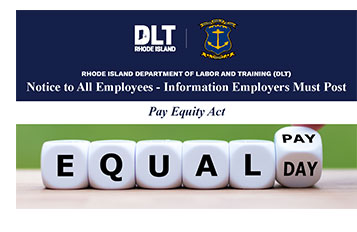| |
THIS ISSUE'S HEADLINES
Pay Equity in Rhode Island: Employers, Are You in Compliance?
Why Estate Planning for Businesses is Critical (Not Optional)
How Closely Held Businesses Can Prevent Management Deadlocks

PAY EQUITY IN RHODE ISLAND: EMPLOYERS, ARE YOU IN COMPLIANCE?
 Rhode Island’s Pay Equity Act was expanded in 2023, creating additional obligations for employers with employees located in, or working from, the state.
Once only prohibiting differences in wages based on gender, Rhode Island’s Pay Equity Act prohibits differences in wages based on additional protected classes, including race, color, religion, sex, sexual orientation, gender identity or expression, disability, age, or country of ancestral origin. In other words, employers are prohibited from paying employees belonging to one or more protected classes less than other employees when performing work that “requires substantially similar skill, effort, and responsibility, and is performed under similar working conditions.” Rhode Island’s Pay Equity Act was expanded in 2023, creating additional obligations for employers with employees located in, or working from, the state.
Once only prohibiting differences in wages based on gender, Rhode Island’s Pay Equity Act prohibits differences in wages based on additional protected classes, including race, color, religion, sex, sexual orientation, gender identity or expression, disability, age, or country of ancestral origin. In other words, employers are prohibited from paying employees belonging to one or more protected classes less than other employees when performing work that “requires substantially similar skill, effort, and responsibility, and is performed under similar working conditions.”
Lawful differentials in pay can be based on factors such as a seniority or merit system, or a system that measures earnings by quantity or quality of production; provided, however, that these factors are applied fairly and reasonably and are not being used as a front for unlawful wage discrimination. Importantly, an employee’s wage history, standing alone, cannot be used to justify an unlawful wage differential, and an employer cannot lower their employees’ wages in order to bring itself into compliance with the law.
Additionally, employers are prohibited from relying on an applicant’s wage history when deciding whether to consider the applicant for employment and when determining what to pay the applicant upon hire. Employers are allowed to make limited inquiries into an applicant’s wage history but can only do so after giving the applicant an initial offer of employment which contains an offer of compensation.
Upon request, the employer must provide a “wage range” to an internal or external applicant for a position, or the “range that the employer anticipates relying on in setting wages for the position.” For an internal applicant, this may include reference to the applicable pay scale, a previously determined wage range for the position, or the actual range of wages for those holding equivalent positions. The same applies to external applicants, with the addition of reference to the budgeted amount for the position.
Employers are also required to display posters containing information on the Pay Equity Act in the workplace (or distribute the same through email or text message to employees who work remotely). These posters, along with other required postings, can be found on the Department of Labor and Training’s website.
This article discusses some, but not all, of the obligations that Rhode Island’s expanded Pay Equity Act places on employers. For more information on how to ensure compliance with the law, or if you have any questions, please contact PLDO attorney Kathryn M. Couture at 401-824-5100 or kcouture@pldolaw.com.
[back to top]

WHY ESTATE PLANNING FOR BUSINESSES IS CRITICAL (NOT OPTIONAL)
 Owning your own business can be extremely demanding. From your customers to your employees, there’s hardly enough time in the day. While most entrepreneurs are consumed by the day-to-day challenges of running their businesses, they often neglect the critical task of planning for the future. Owning your own business can be extremely demanding. From your customers to your employees, there’s hardly enough time in the day. While most entrepreneurs are consumed by the day-to-day challenges of running their businesses, they often neglect the critical task of planning for the future.
A common misconception is that estate planning only applies to one’s personal life and assets. While estate planning is indeed important for individuals, what many business owners fail to realize is that estate planning is equally essential for businesses.
It’s worthwhile stopping for a moment to ask yourself, “What would happen if I could no longer run this business?” Inevitably, a series of other questions will start swirling around in your head. “Should the business continue to run with my current business partners?” Or, “should it be sold?” “Could anyone in my family take over?” Or, “should the business just be shut down?”
The answers to these questions are very important because they establish your goals.
One thing to know is that if you don’t have an estate plan, then state law, depending on the state you live in, dictates what might happen with your business. To explore this further, here’s the following example: Your ownership interest in a business is an asset. In most states, half of your assets go to your spouse and half of your assets go to your children upon your death. You may not want your ownership interest to be split in this way. In this example, having a Will or a Trust, depending on the state you live in, would dictate your goals and intentions for the future of your business.
There are also special considerations for business owners who have professional obligations of confidentiality or who have specific fiduciary responsibilities to clients. For example, a financial advisor operating a small business may have a Will naming their spouse as Executor of their estate. But, the spouse may not be licensed to handle the client investments and act as a fiduciary. In this situation, your plan would need to include a “specially named Executor”; perhaps a fellow licensed colleague who would handle this asset.
Another common misconception is that estate planning only addresses what happens with your business upon your death. And, who wants to think about their own passing? But, what happens if you are incapacitated and unable to run your business? You may want to ensure that the business continues to operate, and the income is used to support your spouse or other family members. Maybe your spouse isn’t the best person to run the day-to-day operations of the business? Perhaps, there’s a trusted employee, or another executive, or a friend, that could help run the business if you are unable? Estate planning is not just about business owners and their families. It can also include provisions for key employees who are integral to the company's success. Importantly, your estate plan ensures there is a procedure in place for any unexpected event that can disrupt the day-to-day operations and continuity of your business.
There are many “tools” an estate planning attorney may suggest to meet your goals. These could include:
- Power of Attorney – documents that name a specific person(s), and sometimes other licensed professionals, to handle your business assets.
- Wills and Trusts – These legal documents provide a framework for the distribution of your assets and specify how your business should be managed after your passing. A well-crafted Will and Trust can help prevent disputes among heirs and ensure that your business assets go to the right individuals or entities. Trusts, in particular, are not only useful tools to reduce estate tax but because they can help avoid probate court. This means your assets, including business interests, can be immediately transferred to the person you want to run the business without having to wait for "court approval" through the probate process.
- Buy-Sell Agreements – These types of agreements are particularly important when you own your business with others and should address what happens if one of the owners dies or becomes incapacitated by specifying who can buy an owner’s interest, under what terms, and for what price.
- Life Insurance – A life insurance policy provides financial security by helping your loved ones pay off debts and cover living, medical or final expenses. Life insurance can also provide funds to keep your business running. For example, often the proceeds from your policy can be used to fund a buy-sell agreement.
In conclusion, estate planning for businesses is not just an option; it's a necessity. It plays a crucial role in ensuring the orderly transition of business ownership, preserving the value of the business, protecting the interests of stakeholders, and securing the financial well-being of employees and loved ones.
At PLDO, our attorneys have deep experience helping business owners achieve their goals - now, and in the future - and we provide a full range of estate planning, trust planning and administration services for both individuals and businesses. If you have questions or need legal guidance, please contact PLDO Partner David P. Craven, Esquire at 401-824-5100 or email dcraven@pldolaw.com.
[back to top]

HOW CLOSELY HELD BUSINESSES CAN PREVENT MANAGEMENT DEADLOCKS
 Differences in opinion on how to achieve a stated goal in a closely held business can lead to disputes that block the enterprise from moving forward. Closely held businesses are characterized by a limited number of shareholders and a lack of public trading. The stakeholders in a corporation or limited liability company often face unique managerial challenges and when the decision makers are unable to agree on major operating or governance issues, a deadlock may occur. The inability to move forward can impede growth, demoralize staff, and, in worst-case scenarios, lead to business dissolution. To avoid a deadlock, the principals must take a proactive and strategic approach that may require compromise and collaboration. If the dispute remains as an obstacle for too long, it could take on a life of its own, snowball into much larger issues and sideline the founders’ initial goals. Differences in opinion on how to achieve a stated goal in a closely held business can lead to disputes that block the enterprise from moving forward. Closely held businesses are characterized by a limited number of shareholders and a lack of public trading. The stakeholders in a corporation or limited liability company often face unique managerial challenges and when the decision makers are unable to agree on major operating or governance issues, a deadlock may occur. The inability to move forward can impede growth, demoralize staff, and, in worst-case scenarios, lead to business dissolution. To avoid a deadlock, the principals must take a proactive and strategic approach that may require compromise and collaboration. If the dispute remains as an obstacle for too long, it could take on a life of its own, snowball into much larger issues and sideline the founders’ initial goals.
The primary causes of a deadlock include equal ownership without an exit strategy, personal relationships or differing visions for the company. A disagreement over the company's direction can be a significant source of conflict. Sometimes, the underlying reason for a business dispute can be related to personal issues by and among the principal owners. Economic issues: i.e., disputes relating to the allocation of resources, compensation, or the distribution of profits can often result in a deadlock which makes it impossible to move the company forward, creates a financial strain and damages the company’s reputation.
Major disputes among stakeholders can lead to litigation and become expensive to the enterprise. The end result of a deadlock will generally lead to a disruptive atmosphere and could result in irreparable harm to the business. The time spent on shareholder or member disputes distracts the parties from moving forward in a productive manner, damaging the reputation of the company, and reducing or eliminating profitability.
It is paramount for the owners of an enterprise to seek counsel regarding the structure of ownership and strategy to resolve personal, financial, and operational challenges. Creating an open dialogue is the cornerstone of any resolution and a willingness to resolve the issue is always better than hunkering down for a fight. The most important preventive measures include making certain that a detailed shareholder or operating agreement clearly outlines a path for resolving a major dispute. Defining the roles of the stakeholders early in the process will avoid confusion and/or paralysis.
Another mechanism for preventing a deadlock is to appoint an outside advisory board or agree - prior to starting the business - to designate alternating periods for the decision-making authority to move the business forward while resolving the differences among stakeholders.
Deadlocks in closely held businesses can be challenging and emotionally charged. However, if the parties step back to understand the root of the conflict and have a desire to facilitate open communication, the deadlocks can be addressed effectively to ensure the business's continued growth and success.
If you have questions regarding your closely held business, please contact PLDO Managing Principal Gary R. Pannone at 401-824-5100 or email gpannone@pldolaw.com.
[back to top]
|
 |



 Rhode Island’s Pay Equity Act was expanded in 2023, creating additional obligations for employers with employees located in, or working from, the state.
Once only prohibiting differences in wages based on gender, Rhode Island’s Pay Equity Act prohibits differences in wages based on additional protected classes, including race, color, religion, sex, sexual orientation, gender identity or expression, disability, age, or country of ancestral origin. In other words, employers are prohibited from paying employees belonging to one or more protected classes less than other employees when performing work that “requires substantially similar skill, effort, and responsibility, and is performed under similar working conditions.”
Rhode Island’s Pay Equity Act was expanded in 2023, creating additional obligations for employers with employees located in, or working from, the state.
Once only prohibiting differences in wages based on gender, Rhode Island’s Pay Equity Act prohibits differences in wages based on additional protected classes, including race, color, religion, sex, sexual orientation, gender identity or expression, disability, age, or country of ancestral origin. In other words, employers are prohibited from paying employees belonging to one or more protected classes less than other employees when performing work that “requires substantially similar skill, effort, and responsibility, and is performed under similar working conditions.”  Owning your own business can be extremely demanding. From your customers to your employees, there’s hardly enough time in the day. While most entrepreneurs are consumed by the day-to-day challenges of running their businesses, they often neglect the critical task of planning for the future.
Owning your own business can be extremely demanding. From your customers to your employees, there’s hardly enough time in the day. While most entrepreneurs are consumed by the day-to-day challenges of running their businesses, they often neglect the critical task of planning for the future.
 Differences in opinion on how to achieve a stated goal in a closely held business can lead to disputes that block the enterprise from moving forward. Closely held businesses are characterized by a limited number of shareholders and a lack of public trading. The stakeholders in a corporation or limited liability company often face unique managerial challenges and when the decision makers are unable to agree on major operating or governance issues, a deadlock may occur. The inability to move forward can impede growth, demoralize staff, and, in worst-case scenarios, lead to business dissolution. To avoid a deadlock, the principals must take a proactive and strategic approach that may require compromise and collaboration. If the dispute remains as an obstacle for too long, it could take on a life of its own, snowball into much larger issues and sideline the founders’ initial goals.
Differences in opinion on how to achieve a stated goal in a closely held business can lead to disputes that block the enterprise from moving forward. Closely held businesses are characterized by a limited number of shareholders and a lack of public trading. The stakeholders in a corporation or limited liability company often face unique managerial challenges and when the decision makers are unable to agree on major operating or governance issues, a deadlock may occur. The inability to move forward can impede growth, demoralize staff, and, in worst-case scenarios, lead to business dissolution. To avoid a deadlock, the principals must take a proactive and strategic approach that may require compromise and collaboration. If the dispute remains as an obstacle for too long, it could take on a life of its own, snowball into much larger issues and sideline the founders’ initial goals.